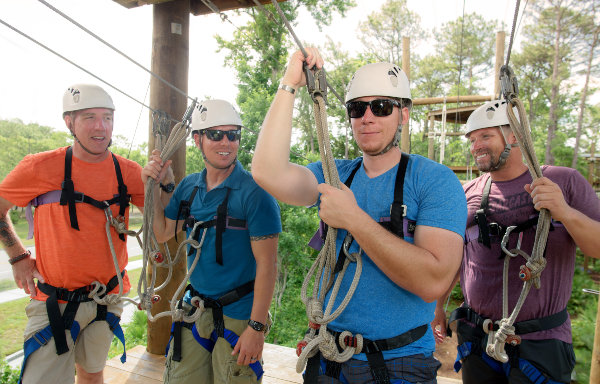Warrior Finds Brotherhood Outside of Military

Army veteran Jason Foster was used to existing in a space surrounded by self-constructed walls. A roadside bomb blast in Iraq caused him a quarter-size brain bleed in his right frontal lobe, seizures, thinking challenges, and speaking problems. After retiring with medical disability, he put up every imaginable wall around him — emotional, physical, and spiritual. He felt completely isolated from the world and said, “I had no reason to exist other than existing,” even attempting suicide at one point.
Jason’s wife was the first one to become involved with Wounded Warrior Project® (WWP), tapping into programs and services for caregivers. Through that involvement, she learned about Project Odyssey®. The 12-week mental health program uses adventure-based learning to help warriors manage and overcome their invisible wounds, enhance their resiliency skills, and feel empowered to live productive and fulfilling lives. The program begins with a five-day mental health workshop.
Two years after his suicide attempt, Jason became involved with WWP, though it wasn’t initially his idea. His wife dropped him off at the airport and told him he would be spending five days at a workshop with other veterans so that he could work on himself. He was not thrilled. Jason wondered how spending several days with complete strangers could aid his rehabilitation or help him relearn his identity.
But he soon learned it could. “I find Project Odyssey one of the most instrumental pieces in my recovery — and it’s by far my favorite thing about Wounded Warrior Project,” Jason said. “The program allowed me to see there are plenty of others who had similar journeys as me.”
Once those lines of communication open between warriors, the healing begins.
Project Odyssey connects warriors with peers in unique settings where they can build lasting, meaningful connections. The program empowers warriors to step out of their comfort zones to overcome fears, improve confidence, and enrich relationships.
“Project Odyssey is an opportunity for warriors to realize they’re not alone,” said Ryan Kules, WWP Combat Stress Recovery Program director. “Warriors learn they’re not the only ones dealing with invisible wounds, and they find other people to support them along their healing journeys.”
Jason found the relationship-building aspect most powerful. He learned how to recover immediate relationships, which allowed him to have purpose in life.
“It allowed me to get far enough in my recovery that I was able to make who I wanted to be into who I was,” Jason said. “Without it, I don’t believe I would’ve started that process with other veterans.”
Jason noted the greatest thing about the military is the brothers and sisters you gain: “When you’re both giving up the things that matter most in your life, it allows you to connect. It was about the brotherhood and sisterhood, not the medals. I thought I’d never be able to find that again, but that’s why Wounded Warrior Project has been so instrumental for me — because I found it again.”
October is National Depression and Mental Health Screening Month. WWP offers mental health services for veterans and families coping with the invisible wounds of war. Get connected today or read more about how WWP helps.
About Wounded Warrior Project
Since 2003, Wounded Warrior Project® (WWP) has been meeting the growing needs of warriors, their families, and caregivers — helping them achieve their highest ambition. Learn more.